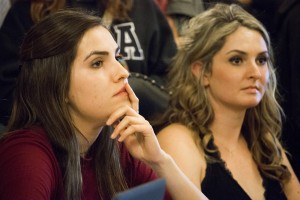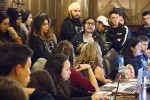The undergraduate student government approved changes to its bylaws Tuesday that will limit potential resolution topics that address political issues.
The bylaw changes passed in a 9-4-0 vote. All seven voting council members who ran with the Bruins United slate voted for the change, and the three members who ran with LET’S ACT! voted against it. About 60 students attended the meeting to give public comment.
According to the bylaw changes, the topics for new Undergraduate Students Association Council resolutions cannot cause harm to students, and those that pass are only representative of the opinion of the council that passed them. Resolutions this council passes are only in effect for the remainder of the academic year.
The council can further suspend bylaws regarding resolutions with a two-thirds vote, a decrease from the previous requirement of a three-fourths vote. The changes will prevent the council from passing resolutions on political issues that some said could antagonize specific student groups.
USAC Facilities Commissioner Ian Cocroft, who proposed the bylaw changes, said he designed it to prioritize resolutions that will impact the UCLA campus directly. He added student groups can still re-propose resolutions passed by previous councils to bring them back into effect.

Students who don’t agree with resolutions the council passes can ask the USAC Judicial Board to evaluate whether a resolution is constitutional, or make an appeal to a council member, according to USAC bylaws.
External Vice President Zach Helder, who voted in favor of the bylaw changes, said he thinks it aims to prevent resolutions about toxic and divisive issues.
In 2014, council members heard nine hours of public comment about divestment from companies that some say profit from alleged human rights violations in the West Bank and Gaza Strip. In the same month, Bruins for Israel and other groups launched a campaign asking for USAC to shift its focus from geopolitical to campus issues.
“It is not USAC’s place to decide whether one community deserves prioritization over another,” Helder said.
Community Service Commissioner Zack Dameron, who voted against the bylaw changes, said he thinks the changes would make council members less accessible to students. Three LET’S ACT! council members, Cultural Affairs Commissioner Amy Shao and General Representatives Aaliya Khan and Anais Amin, also voted against the bylaw changes.
Khan said she thinks the amendment gives the council the power to decide what was important for underrepresented student groups. She added she thinks the changes might silence organizations that represent students of color, whose voices are seldom heard.
Last year, USAC passed divestment resolutions that intended to recognize historical struggles. After tonight’s changes to USAC bylaws, these resolutions are no longer representative of the council’s opinion.
Some student group leaders said they felt the bylaw change would negate past efforts to have the student government recognize their struggles.
Guransh Singh, external public relations officer of the Sikh Student Association, spoke against the changes, saying the USAC resolution passed last year recognizing the 1984 Sikh genocide was a great achievement for his organization.
“To have that taken away from us is very stressful because (it seems) the UCLA student body no longer recognizes the Sikh struggles,” he said. “That makes us feel unsafe on campus.”
Areni Der-Grigorian, vice president of Students for Justice in Palestine, said she does not think the council should have the right to decide which topics harm students.
“Things that are happening on the international level affect individual students,” she said. “(Council members) don’t understand our narrative or where we’re coming from. They don’t understand how transgenerational trauma works.”
Omer Hit, president of Bruins for Israel, said he thinks the change was logical because council members already represent the opinions of the student body.
“It ensures anything we bring to USAC is relevant and important to the majority of the student population,” Hit said. “What we do has to be positive and agreed upon by the student population.”

Newsflash: those previous resolutions still stand despite the fact that they represented the opinion of the Council.
newsflash: not so much.
Lol.
interesting